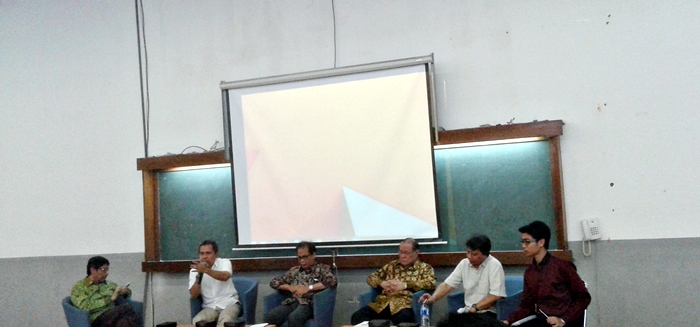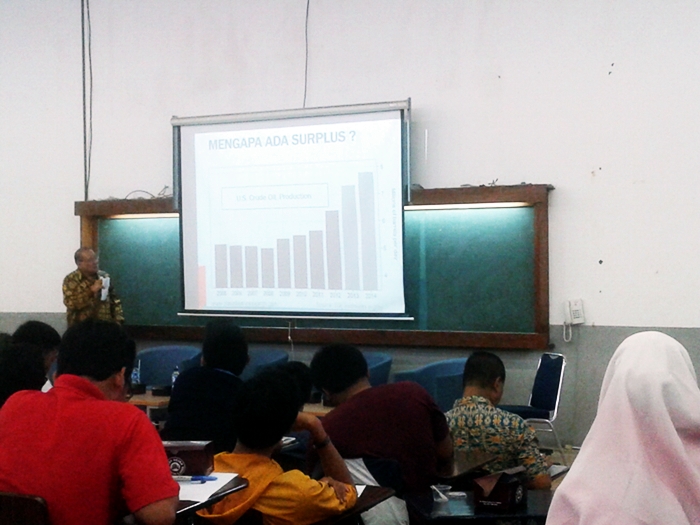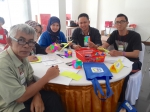Short Class Migas: Enrich the Insight of Non-Conventional Oil and Gas Era
By Mega Liani Putri
Editor Mega Liani Putri

 BANDUNG, itb.ac.id - A public discussion was held on Saturday (31/05/15) about oiland gas located in Room 9232 East GKU. The discussion entitled 'Short Class Migas' was held by the Ministry of Energy and Mineral Resources (ESDM) KM-ITB and its partner Himpunan Mahasiswa Teknik Perminyakan 'PATRA' (HMTM) ITB. More than 200 students joined the discussion whose theme was "The Geopolitics and Non-Conventional Oil and Gas Era in Indonesia".
BANDUNG, itb.ac.id - A public discussion was held on Saturday (31/05/15) about oiland gas located in Room 9232 East GKU. The discussion entitled 'Short Class Migas' was held by the Ministry of Energy and Mineral Resources (ESDM) KM-ITB and its partner Himpunan Mahasiswa Teknik Perminyakan 'PATRA' (HMTM) ITB. More than 200 students joined the discussion whose theme was "The Geopolitics and Non-Conventional Oil and Gas Era in Indonesia". Four speakers were invited and had their point of views on the theme. They were Ir. Widhyawan Prawiraatmadja, MBA, Ph.D. as the staff of Indonesian Ministry of Energy and Mineral Resources (government), Prof. Ir. Doddy Abdassah, M.Sc., Ph.D., who is the lecturer of Petroleum Engineering (academics), Ir. John S. Karamoy 'The Oil-Man'as an entrepreneur, and Ir. Pria Indirasardjana who talked on the economic point of view.
 Mastered by Jordi Lokanata (Petroleum Engineering 2012) as the moderator, Pria, as the first speaker, delivered his speech on the movement of energy security. In his explanation, Pria mentioned that energy security was about availability, accessibility, affordability, crude oil reserves, and renewable energy alternatives. "Nowadays, there is a term of masyarakat galau energi because the demand of energy has been significantly decreased. However, it is not followed by the increase of supply,"Pria explained.
Mastered by Jordi Lokanata (Petroleum Engineering 2012) as the moderator, Pria, as the first speaker, delivered his speech on the movement of energy security. In his explanation, Pria mentioned that energy security was about availability, accessibility, affordability, crude oil reserves, and renewable energy alternatives. "Nowadays, there is a term of masyarakat galau energi because the demand of energy has been significantly decreased. However, it is not followed by the increase of supply,"Pria explained.
The next speech was delivered by Doddy Abdassah who talked about the non-conventional gas in Indonesia. Doddy explained about the theory of Hydrocarbon Resource Triangle; the more non-conventional the resource is, the more it will exist and the production process will be harder, so the reverse is. "The non-conventional resources of oil and gas have been developed like shale oil which in publicly discussed nowadays, coal bed methane (CBM), shale gas, hydrate gas, and many others," Doddy said.
Widhyawan was the last speaker. As taking part in government, he explained about the reason of the abolishment of subsidized fuels. "All this time the subsidized fuels has not only been inappropriately used by the capable Indonesians, but also the foreigners. It has happened in most of the Indonesia's borders," Widhyawan said. He added that the fund for subsidizied fuel and LPG, 246 billion Rupiahs, could be used to develop other sectors such as education, health, agriculture, energy resources industry, and many others.

.jpg)

.jpg)
.jpg)
.jpg)

